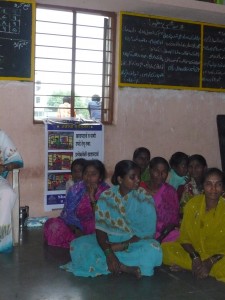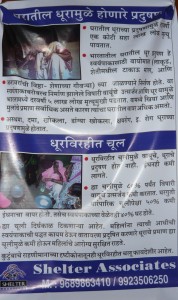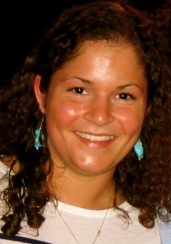Chullah Distribution Photos
August 3, 2009 by Susan Taylor


Chullahs in Sangli
July 26, 2009 by Susan Taylor
I have been back and forth between Pune and Sangli quite a bit over the past two weeks. Last Thursday, I went to Sangli with several members of SA in Pune in order to promote the use of smokeless chullahs (stoves) in cooking. According to the World Health Organization (WHO), three billion people, or half of the world’s population, cook their meals indoors over biomass-fueled open fires. Not only is the majority of this heat wasted, 20% of it is converted into toxic substances like carbon monoxide, benzene, and formaldehyde. In India alone, 500,000 people die annually as a result of this indoor air pollution (IAP). Disproportionately, the majority of these victims are women and young children, as they spend the most time around the fires. These deaths are brought on by diseases resulting from IAP such as bronchitis, emphysema, and asthma.
It’s for these reasons that Shelter is beginning to strongly promote the use of smokeless chullahs for families in slums throughout Sangli. The chullahs are incredibly durable, practical, and greatly reduce toxic emissions and fuel use – directly benefiting the health of women and children. During this trip, 20 chullahs were presented to women and their families in Abha Dhotre slum in Sangli. Prior to the distribution, I created large posters identifying (in Marathi) the health dangers of cooking over an open fire, and the corresponding health benefits of smokeless chullah use, with images of both. In this way, the presentation of the stoves was imbued with education for other families considering a purchase. The chullahs cost Rs 600 (app. $13), but we are developing a payment plan, wherein the chullah is paid for over a period of six months, in monthly installments of Rs 100. Each of the women who received a stove during this visit has already made their initial payment. I have found that it is critical to extend health and hygiene awareness beyond the issues of hand washing and food safety – the two areas I began with. It has become increasingly clear to me just how central a concern indoor air pollution has become, specifically within the slums of Sangli.
I’ve been having some trouble posting pictures from this event… will try to get them up soon!
Health and Hygiene
July 7, 2009 by Susan Taylor
Since my last blog post, my time with Shelter has been very busy! I have been able to visit Sangli a couple times, and even had the exciting opportunity to join Pratima Joshi in traveling to Mumbai and meeting with the Home Minister about SA’s slum rehabilitation housing relocation plan. Last week, I put together and had printed informative posters to be brought into SA’s new health and hygiene program. Collaborating with Pramila (seen below, right), an art teacher who has recently joined Shelter, I created posters with detailed images describing handwashing and food safety issues. With the much appreciated help of my coworkers, I had the text translated into Marathi. I have recently returned from Sangli, where the SA social workers and myself brought the posters in various slum settlements to make informal presentations about health issues. Ultimately, my plan is for these posters will be displayed in community toilet blocks and community centers within the slums, along with extras to be used by social workers in hygiene workshops.


First visit to Sangli
June 19, 2009 by Susan Taylor
Having arrived in Pune on June 11, I am reaching the close of my first week with Shelter Associates! On Tuesday, I had the opportunity to join Pratima Joshi, along with several other members of SA, to travel to Sangli, where many new projects are taking hold.
Below, a member of Baandhani demonstrates the use of smokeless chullahs in Gulab Colony, a slum in Sangli, as women and young children gather to look on. Because no smoke is generated, the health of the entire family can be greatly improved. The smokeless chullah reduces carbon monoxide by 50% while it also reduces the use of firewood by a significant 30%. Each chullah costs Rs 600, or approximately $12.

The following picture was taken at an informal community meeting outside of a home in the slum Aba Dhotre. The two members of Shelter Associates seated in the chairs are Pramila (left) and Shankar (right). Pramila is an art teacher who is creating workshops and lessons for children and mothers living in the Sangli slum settlements. Shankar is a social worker with SA – here he is collecting census information from the women for documentation.

The following photo is an image of Indira Nagar, the largest of the twenty-nine slums in Sangli. Approximately 900 families have migrated here from many different places. Sixty-four community toilets have been established here, half serving men and half serving women. The toilets have been maintained well by a cleaner. Fifty women from Indira Nagar are members of the Baandhani collective.

First post!
May 20, 2009 by Susan Taylor

This is me (far right) with friends at my final banquet during my semester abroad in Jaipur, Rajasthan in Fall 2007
This is a test for my first blog entry. A few days ago (May 17) I graduated from Connecticut College in New London, Connecticut with a major in Human Development. After four great years, I am definitely ready for a new adventure. Throughout my senior year, I developed a strong interest in Shelter Associates through my courses with Professor Bhatia and my developing awareness of FSA’s work. Because of this, I applied for a Davis 100 Projects for Peace Grant in January, and was accepted in mid-March. I am excitedly awaiting my arrival in Pune on June 9, and my work with Shelter Associates that will follow.




